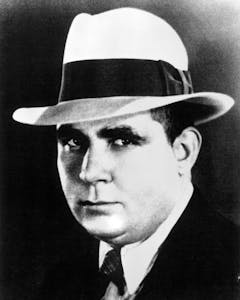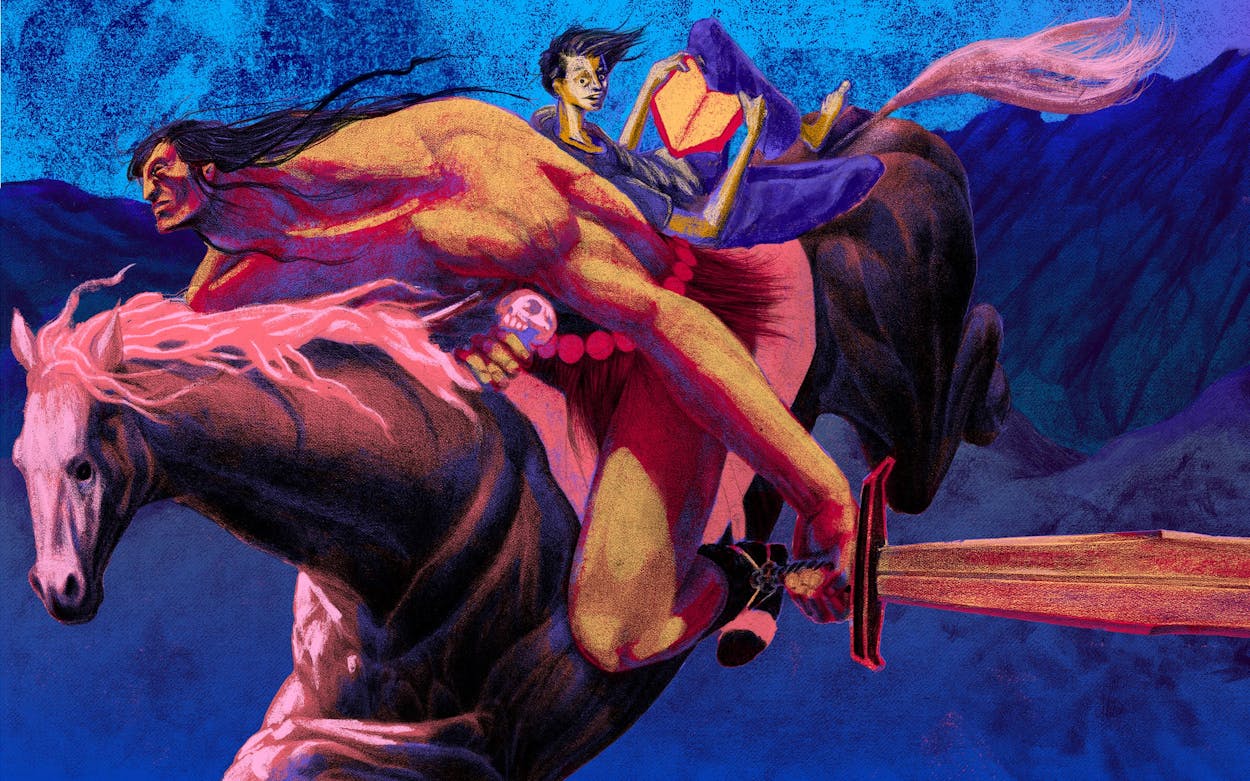I’m twelve and my uncle is walking me down the long hallway at the center of his house. We stop at what should be his linen closet, but when he opens the door, I see that it’s crammed floor to ceiling and front to back with paperback novels. I can take three, he tells me, and when I’m done, I can bring them back and get three more.
Because I don’t know any of these writers, these genres, I take three books that aren’t like each other: one of Don Pendleton’s Mack Bolan adventures, a Louis L’Amour western, and a Conan the Barbarian novel.
I don’t remember the title of the book that took me on my first trip to the Hyborian Age—it could have been Conan the Destroyer, Conan the Defender, Conan the Magnificent—but I do remember it was a thick little mass-market paperback, meaning it probably wasn’t written by Conan’s creator, Robert E. Howard, whose books were usually slim. This being 1983 or 1984, my guess is it was probably hired-gun writer Robert Jordan who introduced me to this muscle-bound, lithe-as-a-cat Cimmerian adventurer. It didn’t really matter who had written it, though. It had a more exciting cover than any of the books at the school library.
In a week I devoured the three novels I’d borrowed. With the Mack Bolan, I understood the breakneck action well enough, but I hadn’t read any Ian Fleming, so I didn’t really get the appeal of this American James Bond, or what he had to do with me. The L’Amour made a lot more sense. One side of my family farmed and the other ran cattle, so when the dads and granddads and uncles came in from a day chasing strays or wrestling with a contrary knifing rig, there’d be dirt in their sweat and blood, just like the heroes in that horse opera. I was hooked deep enough that I burned through the rest of my uncle’s L’Amour collection and then waited at the drugstore’s round rack for the next one.
But Conan the Barbarian.
Imagine you’re a Blackfeet kid growing up in the windswept pastures twenty miles east of Midland, with no other Blackfeet around. Like Conan the Wanderer, -the Adventurer, -the Outcast, I was out in the trackless wastelands, far from civilization. The way I saw it, we’d come up the same. Conan’s homeland of Cimmeria was high and lonely? From our back porch in West Texas, I couldn’t see a single light. Cimmeria was packed with formative dangers? Every third step I took, I found myself entangled in barbed wire or jumping back from a rattlesnake. And when I mapped Cimmeria—the land Conan spent decades away from—onto my world, it could have been Montana, where the Blackfeet are.
In my head, in secret, I was Conan. Like him, my people were from the cold and brutal North. I was just drifting through Texas to hop a few walls, steal a few jewels, maybe fight a giant spider or two.
So I read these Conan novels for the adventure, sure. I was there for the priests of Set and the toppled kingdoms, for the taverns always snarling with violence. But more than that, I was there. I didn’t tell anybody, but in my head, in secret, I was Conan. Like him, my people were from the cold and brutal North. I was just drifting through Texas to hop a few walls, steal a few jewels, maybe fight a giant spider or two.
When you’re a kid looking over into adulthood and all its strange rites and incomprehensible motivations, one way to fend all that off is to align yourself with a different set of values. We all do it, with whatever we have at hand, be it punk rock, comic books, motorcycles, Star Trek—it doesn’t matter. What does matter is that we identify with it so completely that it insulates us from the real world, lets us be Conan the Invincible, -the Unconquered, -the Valiant, at least to ourselves.
Don’t worry, though, this isn’t some lead-up to me walking away from childhood things. Those of us who believed in Conan at the right moment in our lives never stop believing. We might not grow up to become him, but we never grow out of him, either. I still kind of want to be Conan the Freebooter, I mean.
I think that’s maybe what Robert E. Howard wanted, too. No, I feel that’s what he wanted. I feel it in the urgency and the wonder he was able to capture on the page. But after reading Todd B. Vick’s Renegades and Rogues: The Life and Legacy of Robert E. Howard (University of Texas Press), I have an even better sense of what Howard so desperately needed to escape. In Renegades and Rogues, we see a Howard who’s locked in a dangerously dependent relationship with his mother, a Howard who has to shuffle through endless soda-jerk shifts at a drugstore in his hometown of Cross Plains, Texas.
It’s not all doom and gloom, though. We also get a taste of Howard’s heartfelt correspondence with the horror writers August Derleth and H. P. Lovecraft, we see him celebrate a story sale, and, most importantly, we see him living his best life not in that small house in Cross Plains, but through Kull, “a thinking man’s barbarian,” and his other creations: Solomon Kane, El Borak, Bran Mak Morn, Breckinridge Elkins, and, of course, Conan.
When your own life isn’t giving you what you need, you step into another, right? For however long he could make this next story last, Howard was Conan or Kull or Solomon Kane. Instead of caring for his ailing mother or suffering the withheld approbation of the people he saw on the street, he could write his best self into larger-than-life adventures and freeboot his way not just out of his own life, but into one so pungently real and vital that it still captivates us today.
Yes, Howard was creating the sword-and-sorcery genre, but that wasn’t necessarily his intention. As Howard himself once noted, he was “rewriting history in the guise of fiction”—and the history he was intent on improving, I submit, was his own.
It’s not just Conan stepping out of the shadows of that raucous tavern in the 1933 story “The Tower of the Elephant” and taking down the bully, it’s Howard. He was living the only way he could: on the page. He was using a pen to carve his own world away, and the person left standing was the person Howard believed he could have been, if he had been born in a very different age.
This is how you save your own life.
Or it’s how you try to, anyway.
You write your way over a wall and into a forbidden garden, where you bring lions down with a broadsword, climb ropes made from the “tresses of dead women,” fight spiders the size of pigs, walk across gem-encrusted floors, and do battle with dark gods and crafty wizards. And when the spiders in this role-playing game are that big, the wizards that dangerous, then you have to make your character bigger, badder, faster, stronger.
In short, to survive, you have to become Conan.
That doesn’t mean the dice always rolled in Conan’s favor, though.
Take the end of “Tower of the Elephant.” After slashing the lion and crushing the spider, Conan holds the tower’s jewel in his hands. And yet, rather than abscond with the treasure, as we would expect Conan the Raider, -the Renegade, -the Rogue to do . . . he does the right thing. He uses the jewel to release an extraterrestrial god from its imprisonment, then walks away empty-handed as he watches the tower come down in a crash of “shining shards.”
Did Howard have Conan do this because this Cimmerian was actually a decent guy, as interested in justice as his pulp contemporaries Batman, Sam Spade, the Shadow, and the Lone Ranger (all of them creations of the 1930s)?
I don’t think so, no.
The reason Conan doesn’t walk away with this treasure that would have transformed his life is simply because Howard knew he was going to need to dress up as Conan again. If Conan were to sneak back out with this fabled jewel, then he would be swimming in gold, and have no reason to start up another adventure.
Conan the Triumphant, -the Indomitable, -the Champion?
Not for long, please.
If Conan gets away with the jewels, then Robert E. Howard has nowhere to retreat to, no place that offers the heightened action and mortal stakes he felt sorely lacking in Cross Plains, and that he so desperately needed.

Howard doesn’t actually want the Tower of the Elephant’s jewel, he wants the wall around that jewel, he wants the lions in that forbidden garden, and the guards he’ll have to sneak past, the pig-size spider scuttling at him across that gem-encrusted floor, the dangerous wizard waking from his lotus sleep with an evil hiss.
In Cross Plains, all Howard had to fight were his own demons, the commonplace disappointments of his own life. So, in his Conan stories, he created fleshier, more impressive demons, demons he could actually knock down—with a sword. At least for a while. Or, for as long as he could. At only thirty years old, a little more than a decade into being a published writer, all Robert E. Howard would be left with was that crash of shining shards. He took his own life in 1936, unaware that, decades later, his creation would reach a mass audience, in comic books, movies, role-playing games, and three different TV series (with a fourth on the way from Netflix).
For one glorious moment, however, this college dropout, onetime stenographer, and avid boxing fan strode up out of rural Texas and into the Hyborian Age, and left the door open for the rest of us to walk through—for me specifically, it feels like.
I grew up in the same part of Texas you did, Mr. Howard.
Our birthdays are even the same.
And when the world doesn’t make sense, I retreat from it just as you did, and I stand outside the Tower of the Elephant, and I smile because I know I shouldn’t try to sneak over that wall. I know it’s wrong and dangerous and is probably going to end in disaster, if not death.
But I jump that wall just the same.
Some nights I even find you already in there, Mr. Howard, and you shush me—there are so many dangers here. But then you hook your head to the side, a signal that I should follow you.
I have been since I was twelve, sir.
Stephen Graham Jones is the Ivena Baldwin Professor of English at the University of Colorado Boulder and author of the recent New York Times best-seller The Only Good Indians.
This article originally appeared in the April 2021 issue of Texas Monthly with the headline “Conan the Vicarious.” Subscribe today.
- More About:
- Books







